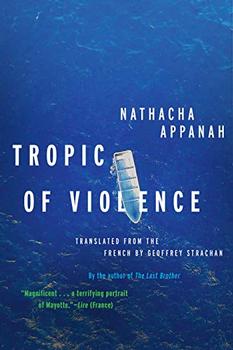Summary | Excerpt | Reviews | Beyond the Book | Read-Alikes | Genres & Themes | Author Bio

This article relates to Tropic of Violence
 An official department of France, Mayotte is a group of islands located in the Indian Ocean, off the coast of southeast Africa. This unique political and geographic setup has led to the development of a complex, fraught national identity for many of its people, with problems related to crime, population density, poverty and poor social care being fueled by increasing pressure from mass immigration.
An official department of France, Mayotte is a group of islands located in the Indian Ocean, off the coast of southeast Africa. This unique political and geographic setup has led to the development of a complex, fraught national identity for many of its people, with problems related to crime, population density, poverty and poor social care being fueled by increasing pressure from mass immigration.
Once part of the former French colony of Comoros, Mayotte voted overwhelmingly in favor of remaining part of France when Comoros declared independence in 1975. A 2009 referendum confirmed Mayotte's desire to be classified as an integral part of France, and this was made official in 2011 when the region was declared the 101st French department (an administrative term that denotes Mayotte's place within France's overall governmental system). This has led to many political and cultural clashes, however. Despite French being the official language, for example, less than half of the 250,000+ population are able to read and write it. Meanwhile, Comoros continues to dispute Mayotte's French status altogether, claiming ownership of the region and demanding its people have the right to travel to and from the islands freely.
Mayotte is also struggling to cope with an influx of undocumented migrants and asylum seekers who are utilizing the travel routes being opened up by Comorians. Many people fleeing war in Africa and the Middle East see Mayotte and its association with France as a quicker, safer means of accessing European aid, rather than risking the perilous journey across the Mediterranean in search of the continental mainland. The number of people seeking safety on Mayotte doubles every year, in fact, to the extent that nearly one in two residents are now foreigners. So vast is the scale of the problem, services set up by the French government to process asylum seekers are completely overwhelmed, with more and more people being condemned to overcrowded slums—the largest area in any part of France without access to water and electricity.
Tensions born from this issue have reached a boiling point on a number of occasions, with people on both sides feeling equally betrayed by a lack of help from officials. Locals feel that health, education and housing services are suffering, overstretched by demand from migrants. This has led to protests and distressing attempts to round up and expel foreigners from the region. On the other hand, those coming to Mayotte expecting the quality of aid associated with France are finding they aren't entitled to the same rights they would have on the mainland, with few being granted the financial support or work permits they hoped for.
The greatest impact of all of this is almost certainly felt by the islands' children. Astonishingly, almost 45 percent of Mayotte's population is under the age of 15. This is due to the booming birth rate and the vast quantity of abandoned, unchaperoned and orphaned young people arriving on the islands' shores in search of help. Aware of how vulnerable these children are, and just how few options are available to them, slum lords are known to draw them into gang violence, or to exploit them through prostitution in exchange for poor accommodation.
In her novel, Tropic of Violence, author Nathacha Appanah looks at the human cost being incurred by Mayotte's people, attempting to give a voice to the children otherwise left to suffer in silence.
Map featuring Mayotte, courtesy of CountryReports
Filed under Places, Cultures & Identities
![]() This article relates to Tropic of Violence.
It first ran in the May 20, 2020
issue of BookBrowse Recommends.
This article relates to Tropic of Violence.
It first ran in the May 20, 2020
issue of BookBrowse Recommends.
Your guide toexceptional books
BookBrowse seeks out and recommends the best in contemporary fiction and nonfiction—books that not only engage and entertain but also deepen our understanding of ourselves and the world around us.